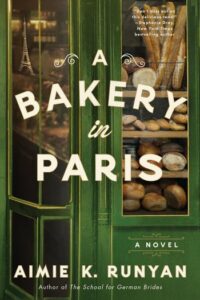
On Being a Writer and a Mother to Children Who Don't Love to Read
Aimie K. Runyan on Instilling a Lifelong Love of Reading In Her Children... on Their Terms
Last November, I made a birthday cake from scratch for my daughter, and both of my darling kids pitched in to help. My son wanted to help mix the ingredients and make the strawberry reduction for the frosting, while my daughter, ever the artist, wanted to frost and decorate the finished product. It was a blissful afternoon that resulted in a delightfully fluffy vanilla cake with decadent strawberry frosting—and some quality time with my sweet kids doing one of my favorite things: baking.
I think, for those of us inclined toward having children, it’s typical for parents to aspire to share their interests with their kids. A prime example of this is that my father *loves* fishing. We went out on the lake many times every summer and I can still feel the sun beating down on my face as we spent hours looking for the perfect spot to catch rainbow trout. I’m no kind of fisherwoman these days, but I loved sharing those memories with my dad because I knew he enjoyed the time out on the water with his girls. And even the most apathetic angler feels a thrill at their first catch.
When my turn came to have children, I imagined many of those messy days in the kitchen teaching them how to bake sumptuous desserts to impress friends and loved ones. It seemed essential that they learn how to make a perfect cheesecake with no cracks and splits before they go out into the wilds of adulthood. I imagined speaking French with them, so they’d be fluent before kindergarten. Most of all, I envisioned providing them a glorious-vibrant hued library full of books where they would, as I had done, fall in love with the written word. I was going to give them universes to explore, from Narnia to Middle Earth, and what’s more, they would love me for it.
I figured the baking and the French might be hit or miss, but reading? That would be a gimme, wouldn’t it? But as fate would have it, I am the mother of two brilliant, funny, adorable kids who do enjoy baking with me…but who also happen to be what the industry calls “reluctant readers.”
I read to my babies from birth onward, and they liked it well enough. My daughter would sometimes pretend to read when she was a toddler, but my son showed no interest in books whatsoever. I figured they might warm up to it as they got older, but they never really did. I worked with them on all the skills to set them up for reading success before they started school and long after they’d begun, but it was basically torture for all of us. As an author whose professional life (and a fair amount of my off hours, too) revolves around the written word, it was a personal challenge for a long time. To distill it to its barest truth: it felt like a rejection of one of the most vital parts of my personality.
At first, the reality I felt I needed to swallow was that my children do not exist to affirm me. Which is absolutely true. Even if my kids despise fiction in all its forms, that is entirely their prerogative. A scientist can’t expect that their children will instinctively grow up enamored of biology, no more entitled was I to insist that my children enjoy books. My dad loves fishing, but I am not under any obligation to like it.
But there is a difference.
I envisioned providing them a glorious-vibrant hued library full of books where they would, as I had done, fall in love with the written word.
One can live a full life without fishing, no matter what my dear father may say about it. But reading is a vital life skill. And I didn’t just want my kids to be able to read, I wanted them to read so well that it was a joy. I wanted them to become voracious consumers of books, and not just as a means of bonding with my kids (though that would be a nice bonus). A child who can read fluently and for pleasure will simply have access to more knowledge. I would have been happy for them to eschew each and every one of my favorite childhood classics if they curled up with a kids’ National Geographic or a thirty-year-old encyclopedia. Reading the basic pathway to a better life. The sort of life I want for my children.
But they weren’t there yet.
This is the reality I faced head on when I had to homeschool my children for a year and a half in the darkest days of the pandemic. As a newly single mother I was charged with the intimidating task of having the sole responsibility of teaching my then first and third graders how to read from almost the ground up.
Within a few weeks I came to a conclusion that their educators had failed to: both children are dyslexic. This wasn’t a case of “reluctance” to read. The act of opening a book and ciphering words, let alone phrases, sentences, paragraphs, and chapters is the mental equivalent of sprinting a marathon for them. Like most kids with dyslexia, my children understand all the concepts in the books they encounter with a great deal of nuance and complexity. They simply process the code in ways I (and the system at large) don’t grasp, and it requires a new pedagogy. And for me, a new approach to story.
Because I felt we couldn’t fully ignore the physical act of reading, we would spend some time each day laboring over the easy primers, picking out each painful syllable, but I couldn’t leave things there. If their experience was limited to these frustrating half-hour segments with 70-year-old reading passages, they would never enjoy reading. To try and salvage their enjoyment of literature, I divorced the notion of story from the printed word.
We listened to audiobooks. I’m personally a huge fan of them for my own use, so I decided to find a few titles the kids would enjoy and have them follow along on the pages. I read aloud with ridiculous character voices without concern for my own dignity. We watched the movies after we read the books and discussed how the interpretations differed. We worked on the comprehension questions out loud and with a deeper analysis than the provided materials had demanded of them. The kids had some agency in choosing the novels we read because I felt they could learn from a choose your own adventure novel about the Oregon Trail as well as from the assigned curriculum. My historian husband and I even took a road trip to see some of the sites to bring those stories to life and helped us bond as a newly formed family.
We learned to enjoy story.
And while we stood around the kitchen last fall baking a cake for my daughter’s birthday, I told them about the joy I had writing about a little green bakery in the corner of Montmartre. I told them about the sacred importance that bread and bakeries had (and have) in the French diet and culture. I told them about the Paris Commune and how the common people rose up to govern themselves. I told them about the hardships the people of Paris endured when they were rebuilding the city and their lives after World War Two. I told them about the characters I created, Lisette and Micheline, and how they overcame the obstacles life sent their way.
And though it may be some time before they curl up with their own copies of A Bakery in Paris, their copies are waiting on a special shelf with inscribed copies of all my other books, waiting for the day they’re ready. And even if they never crack the covers, I hope down the line when they see the copies on their own bookshelves, they’ll remember the frosty November day we made a vanilla cake with strawberry frosting and remember the enjoyment we had that afternoon of sharing a story.
__________________________________

A Bakery in Paris by Aimie K. Runyan is available from William Morrow, an imprint of HarperCollins Publishers.
Aimie K. Runyan
Aimie K. Runyan is a multipublished and bestselling author of historical fiction. She has been nominated for a Rocky Mountain Fiction Writer of the Year award and two Colorado Book Awards. She lives in Colorado with her wonderful husband and two (usually) adorable children.



















